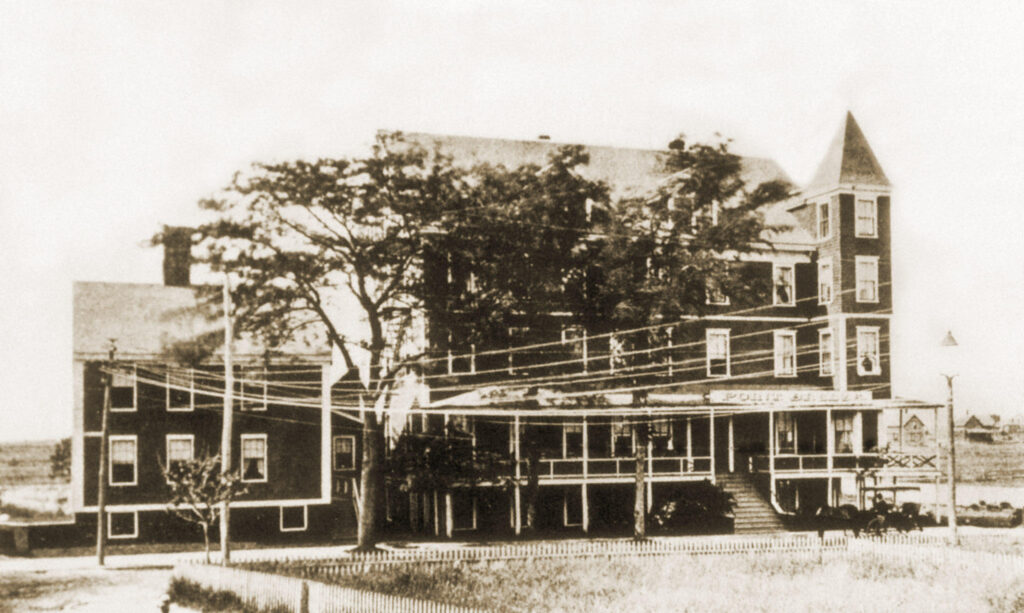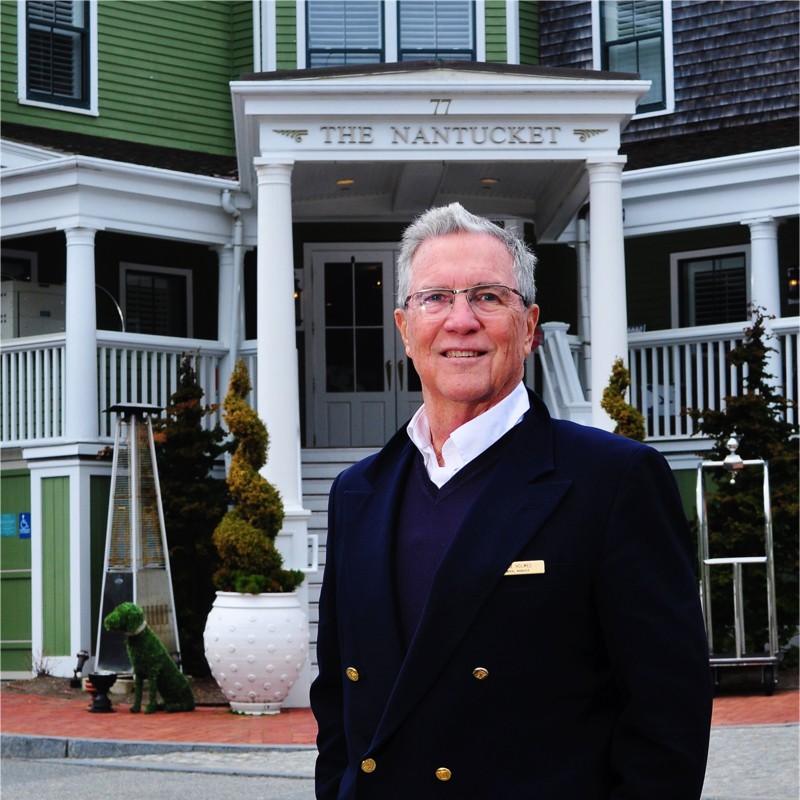I recently had the chance to speak with Gwenn Snider and Jamie Holmes of the Nantucket Hotel & Resort about building the right team, continual learning, and delighting guests. Below is a summary of what they shared in our conversation on how this hotel became #1 hotel in the US on TripAdvisor and remains year after year among the top-rated hotels.
—
The Nantucket Hotel & Resort was built in 1891 and is one of the last great seaside hotels that once dotted coastal New England.

When Little Gem Resorts co-owner Gwenn Snider and her partner, Mark Snider, first learned that the property was available for purchase, it was in a sad state. The previous owner had bought it with the intent to develop it into a condominium hotel. But they went bankrupt, leading to the hotel being boarded up for years. It had become an eyesore, and a sore point for Nantucket residents because it had such a long history in the community.
“We were so lucky to find a way to buy it in 2012,” Snider said. But a lot of work needed to be done. “When we bought that hotel, it was a shell. You could see from the fourth floor to the basement.”
Determined to open by the following July, she embarked on what she calls an “extreme hotel makeover” – with 200+ people working on the property every day for 184 days. “Everyone said we would never do it. But we did.”
With the makeover complete, the next challenge was to build a hotel operation that delivered on the property’s potential. And to do that, she hired Jamie Holmes as general manager.
“He came up from the Caribbean in a trench coat in the middle of January to a building that was under construction. I thought to myself, ‘I don’t know how he’s going to envision what his life might be. But, boy, he is a wonderful person.’”
Enter Jamie Holmes: The zoologist from Florida

Jamie Holmes was studying zoology at the University of Florida when he first began working at a hotel. “I found that that was my calling and my passion,” he said. “I didn’t have preconceived knowledge on how it was supposed to work. So I had to learn and I had to figure out what is the very best way to be successful.”
That success started with putting the right team together. “Early on, I learned my main goal always needs to be to put the right team together.” According to Holmes, that means a group of people excited about serving guests and constantly finding new ways to do that. “A great host is almost like a golden retriever puppy. Just so happy to see you.”
This strategy paid off for him. He ended up in a variety of leadership roles across several prestigious properties – including the Ritz Carlton in St. Thomas – and got that hotel to the top of TripAdvisor rankings there, in addition to being rated the #1 hotel in Travel and Leisure and #1 in Conde Nast Traveler.
Holmes credits this success to not only hiring the right people but setting the right expectations. “We have a written vision to serve our customers. And when we hire people we do orientation and tell them right up front that we have this really high expectation. We tell them that we didn’t just hire you, we selected you because we believed that you had the ability and the personality, and the desire to deliver at this level. We look for sincere people with a high level of integrity that are self-starters.”
That doesn’t mean everyone acts like a game show host. “We also don’t look for just really outgoing people. You need all types of people. You need the engineers to be detail-oriented and the chefs need to have a passion, but they don’t have to be able to go out and talk to every customer. Some are good at that and some aren’t. But we tell them upfront that our expectation is to be world-class in whatever they do.”
Creating a culture of winning
Holmes asks new hires if they’ve ever been on a winning team. “If they say yes, then they know how exciting it is. If they say no, then we say they’re going to be on one and going to find out how exciting it is to be on a winning team. It makes a difference when you go to work every day knowing you’re on a winning team.”
When someone feels they’re doing something important, putting some good in the world, and have purpose in everything they do – they are far less likely to switch to another job. It’s crucial for both attracting and retaining the right team.
Life is about a lot more than the paycheck. Job satisfaction comes from feeling appreciated and respected, creatively expressed, and challenged to reach their full potential.
“Our team has fun doing what they do. Drivers don’t just drive guests. They drive them to talk with them.”

External and internal guests
Each person on the team is responsible for supporting the overall success of the hotel. In the words of Holmes, “We say we not only have external guests – our customers and club members and wedding planners – but also internal guests. Each department is here to serve each department and help each other.” This mentality was critical last year when the hotel quickly went from being really slow to really busy.
It’s also an operating model that is important for developing your team. People feel even more capable as they support various roles because it shows them how the whole operation works, giving them an advantage if they want to progress in their career.

All hands on deck
Snider visits the property weekly and talks with the staff to reinforce their mission. Holmes does that daily. But they’re careful to not let this get in the way of serving guests.
“It doesn’t take a lot of time to talk to your staff,” Holmes said. “My staff are so busy they don’t have time for me to stand around and talk to them all day. They want to know what’s going on. They want to know what they’re doing right. They want to know how they can do it better. They want to know that if they need something, I’m going to get it for them. And if they need help, I’m going to help them. And then they want me to get out of the way so they can go ply their trade. They know what to do. My chefs know how to cook, my waiters know how to wait. My bartenders will create a cocktail with your name on it. They don’t need me to manage them to do that.”
When Holmes talks with his team, the focus is on continual improvement. “Because we’re a small, independent hotel, we don’t have all the rules on a book on the shelf. We’re creating them as we go. We’re evolving and developing with our people.”
Constant feedback collection
Constant learning requires constant feedback collection, and the team does this in a few ways.
The first is through automated surveys. The team sends a survey to every guest the day they leave because immediate feedback is so important.
On top of that, the team is trained to collect feedback in person. “We say ‘I hope you had a great stay – is there one thing we could have done better?’” This acknowledges the good parts of the stay and provides opportunities for constant learning and improvement.
Transparency in quality
One of the ways the hotel ensures a culture of excellence is by sending every review by email to every manager, Holmes, and Snider. “If I wanted to pretend everything was always great I couldn’t for long because all my managers and the owners are reading what the customer is saying,” Holmes said.
“We read every survey and every review,” Snider confirmed.
Responding to everyone
Every survey response gets a response, Snider shared. “When you get a call from the owner or the manager and you’re not expecting it because you just said, the breakfast wasn’t hot or whatever it might be, that makes a difference.”
“We start by thanking them for filling out the survey,” Homes explained. “And then whatever they talk about I’ll comment on. They may say Wayne in the restaurant was the greatest guy in the world. Then I’ll write back and say ‘Thank you so much for staying here. Guests like you are a pleasure to serve. We’re so glad that you got to experience Wayne’s special hospitality. We think he’s great, too.’” The same is true for things that didn’t go so well. “If they say the air conditioner clicked in room 38, I say we appreciate you telling us that and we’re going to jump on that right away. I let them know by sharing that feedback, the next guest is going to have a better stay. Whatever it is, we respond.”
The same goes for online review sites like TripAdvisor – they use this process to craft a personalized response to every review.
Same-day responses for everything
This philosophy of personal responses to feedback applies to all inquiries.
“We’re very quick. If you call us and leave a voicemail, it’s answered every day. You email us. It’s answered every day. You want to have a wedding with us, you have a response the same day.”
That response may not be a full event proposal, but it could be asking about their dream for the event. In our always-on culture, speedy responses are a form of service.
Personal responses for bigger issues
If the feedback is for more significant things, Holmes and his team don’t send an email or a text. They pick up the phone. “We say ‘I understand that you had an issue. I want to know about it. I’m sorry that it happened. It’s not acceptable. And we’re going to take care of that.’”
“I might leave them a voicemail and they don’t have to call me back. They’re the customer. It’s their time. They paid. But they’re so impressed that we do that emotional deposit, that we reached out to them and put ourselves out there to hear what they have to say. And they’ll tell you more and how to resolve it,” said Holmes.
“An unhappy customer is your greatest opportunity,” Snider added. “If you take someone that has had a bad experience or has a problem, and if you can solve that problem in a way, you’ve converted someone into a loyal guest. It happens all the time. Those are opportunities.”
Earning positive reviews
The only way to reliably earn positive guest reviews is to deliver a positive, memorable experience for your customer. “The review a guest provides is a reflection of whether you delivered on your promise and your brand’s value proposition,” says Holmes.

Guests feel special from the moment they step on the property. “Great hospitality begins with the way someone is greeted at the door,” Snider said. “Friendliness and kindness go a long way to shifting a person from the stress of getting to their destination to suddenly relaxing.”
“Our hotel is in a destination that people are so happy to arrive at. It is our job to make sure that we fulfill that anticipation. And it’s in the details. It’s in those small moments.”
Unlike some properties looking to automate the check-in process, the Nantucket Hotel & Resort team put in extra effort to make guests feel welcome. “No guest goes to their room without our staff taking them to the room and engaging them all the way there,” says Holmes.
Once they check-in they’ll find a gift waiting for them. “We have a handwritten note to every single guest who arrives and we have a crafted box of chocolates that are chocolate-covered cranberries because Nantucket is famous for our cranberries.”
The results
Money is made in hotels when demand for that property is high, and the Nantucket Hotel & Resort has been able to achieve this by keeping their guests so happy.
“There are so many fantastic hotels around the country that are more glamorous. But our guest satisfaction is what drives our very high occupancy. People love the Nantucket Hotel. They think ‘that was different,’” Snider shared.
But it’s not just occupancy, better service enables charging a higher rate. “We may be expensive, but we often exceed people’s expectations because we don’t just assume they’re going to spend that money with us.”
Holmes goes further. “Anybody who’s been in the business for a while knows how expensive it is to get a new customer. It’s so much less expensive to get a repeat customer and get their family and their friends.”
That’s why loyalty is so important. “When a guest is loyal and you make a mistake, they’ll defend you,” Holmes says. “They’ll come to see you and say, ‘We love this place, but you need to do something about this. That room #38 – my favorite room – has something wrong with the chairs you need to fix.’ They feel like they’re partnering with you on making certain their vacation is good. Our customers want our hotel to be good because they want to have a place that they can go and feel at home.”
Besides repeat business, advocacy from guests has also become a big driver of new business for the hotel. “TripAdvisor is the number one place we get new customers,” Holmes shared.
Closing thoughts
As a hotel owner, Snider believes success is dependent on how well a hotel team can take care of its guests. “I can’t imagine how you’re going to be successful with a hotel if you’re not interested in delighting your guests because there are so many choices that people can make about where they’re spending their money if you do not.”
Delighting guests starts with hiring and developing the right team, Holmes believes. “If you take care of your staff, they’ll take care of the guests and the guests will take care of the owners.”
How do you achieve this? In the words of Snider, “Everybody wants to be part of something. Everybody wants to feel that they are working towards something for the greater good.”
At the Nantucket Hotel & Resort, that goal is being realized each day.
—

Adele Gutman has been honored as one of the Top 25 Most Extraordinary Minds in Sales & Marketing by the HSMAI for achieving exceptional results, driving revenue through Guest Experience and Reputation Cultivation. During her tenure as Vice President of the Library Hotel Collection, the brand astonished the hotel industry by repeatedly earning the #1 highest guest satisfaction rating of any luxury hotel brand in the world. Now, Adele is available to help hoteliers implement the award-winning Five Star Review System she developed over decades in hospitality. Learn more about Adele and The Five-Star Review System here. Request your free assessment with Adele today.









